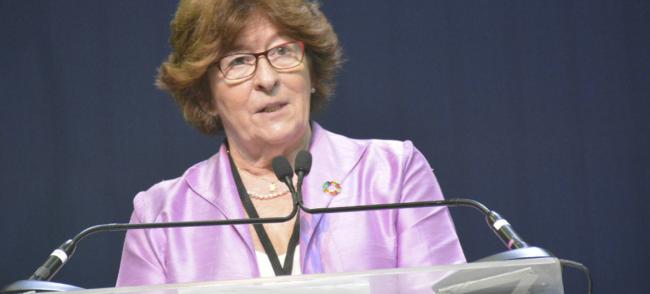
Safe and orderly migration is ‘in everybody’s interest’, says senior UN official
July 13 (IBNS): International migration “has been with us forever”, and a safe and orderly means of facilitating it is “in everybody’s interest”, said a UN envoy.
Speaking to UN News during the final round of negotiations on a global compact for safe, orderly and regular migration, Louise Arbour said that migration should not be seen in terms of good or bad, but as “a phenomenon that’s been part of human history”, with immense benefits if well handled.
As the Special Representative of the Secretary-General on International Migration, Arbour has worked with Member States and other stakeholders throughout the process to develop the global compact. She said the process had “already come a long way” during the prior 18 months, in pushing back against some of the negative, sometimes hostile, misperceptions about migrants.
Citing the complex motivations causing people to uproot themselves, such as the desire for better education, Ms. Arbour said it was “very unhelpful” to label all the world’s 258 million non-refugee migrants as people in “greedy pursuit of more economic benefits”. The negotiation process had brought to light the enormous economic benefits of migration for countries of both destination and origin, she said.
The UN General Assembly decided to develop the global compact when it adopted the New York Declaration at the Summit for Refugees and Migrants, in September 2016. The compact will be the first intergovernmentally negotiated agreement, prepared under the auspices of the United Nations, to cover all dimensions of international migration in a holistic and comprehensive manner.
While it is not aimed at providing immediate answers to current short-term migration crises, Ms. Arbour said the compact will help enlighten different approaches to address them. She described it as an agreement by Member States to cooperate over a long-term vision on how to harness the benefits and mitigate the challenges of human mobility.
She added, however, that the question of detention of migrants, generally of migrant children, had been very prominently featured in the negotiations. “There’s a lot of concerns about the inappropriateness of detaining people on the move in circumstances where, in fact, the detention increases their vulnerabilities rather than assisting them,” she said.
Pointing out that it was for countries to determine their own migration policies, she said the key was more international cooperation to facilitate the enforcement of such policies. It was not a question of facilitating or reducing migration, she said, the objective was safety and order.
The General Assembly is expected to consider the compact for adoption at an intergovernmental conference to be held in Morocco in December 2018.
UNIC Mexico/Antonio Nieto
Support Our Journalism
We cannot do without you.. your contribution supports unbiased journalism
IBNS is not driven by any ism- not wokeism, not racism, not skewed secularism, not hyper right-wing or left liberal ideals, nor by any hardline religious beliefs or hyper nationalism. We want to serve you good old objective news, as they are. We do not judge or preach. We let people decide for themselves. We only try to present factual and well-sourced news.







